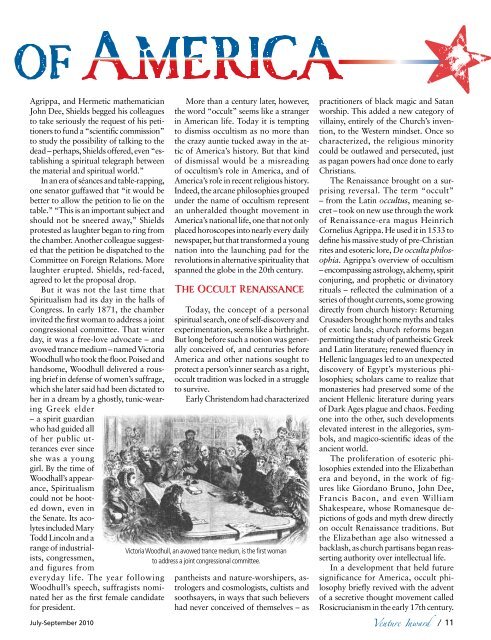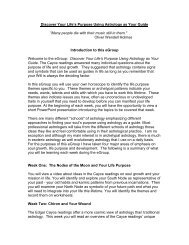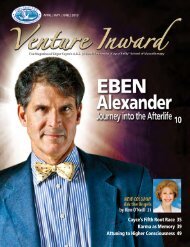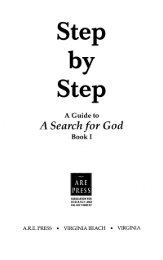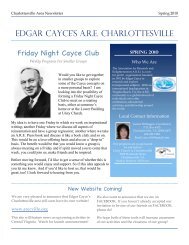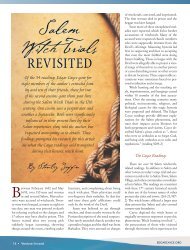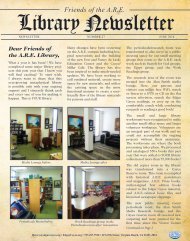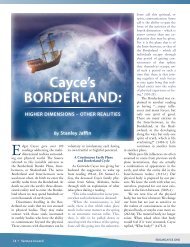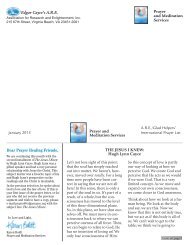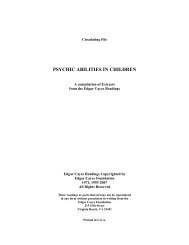new this issue - Edgar Cayce
new this issue - Edgar Cayce
new this issue - Edgar Cayce
Create successful ePaper yourself
Turn your PDF publications into a flip-book with our unique Google optimized e-Paper software.
Agrippa, and Hermetic mathematicianJohn Dee, Shields begged his colleaguesto take seriously the request of his petitionersto fund a “scientific commission”to study the possibility of talking to thedead – perhaps, Shields offered, even “establishinga spiritual telegraph betweenthe material and spiritual world.”In an era of séances and table-rapping,one senator guffawed that “it would bebetter to allow the petition to lie on thetable.” “This is an important subject andshould not be sneered away,” Shieldsprotested as laughter began to ring fromthe chamber. Another colleague suggestedthat the petition be dispatched to theCommittee on Foreign Relations. Morelaughter erupted. Shields, red-faced,agreed to let the proposal drop.But it was not the last time thatSpiritualism had its day in the halls ofCongress. In early 1871, the chamberinvited the first woman to address a jointcongressional committee. That winterday, it was a free-love advocate – andavowed trance medium – named VictoriaWoodhull who took the floor. Poised andhandsome, Woodhull delivered a rousingbrief in defense of women’s suffrage,which she later said had been dictated toher in a dream by a ghostly, tunic-wearingGreek elder– a spirit guardianwho had guided allof her public utterancesever sinceshe was a younggirl. By the time ofWoodhall’s appearance,Spiritualismcould not be hooteddown, even inthe Senate. Its acolytesincluded MaryTodd Lincoln and aJuly-September 2010More than a century later, however,the word “occult” seems like a strangerin American life. Today it is temptingto dismiss occultism as no more thanthe crazy auntie tucked away in the atticof America’s history. But that kindof dismissal would be a misreadingof occultism’s role in America, and ofAmerica’s role in recent religious history.Indeed, the arcane philosophies groupedunder the name of occultism representan unheralded thought movement inAmerica’s national life, one that not onlyplaced horoscopes into nearly every daily<strong>new</strong>spaper, but that transformed a youngnation into the launching pad for therevolutions in alternative spirituality thatspanned the globe in the 20th century.The Occult RenaissanceToday, the concept of a personalspiritual search, one of self-discovery andexperimentation, seems like a birthright.But long before such a notion was generallyconceived of, and centuries beforeAmerica and other nations sought toprotect a person’s inner search as a right,occult tradition was locked in a struggleto survive.Early Christendom had characterizedrange of industrialists,congressmen,to address a joint congressional committee.Victoria Woodhull, an avowed trance medium, is the first womanand figures fromeveryday life. The year following pantheists and nature-worshipers, astrologersand cosmologists, cultists andWoodhull’s speech, suffragists nominatedher as the first female candidate soothsayers, in ways that such believersfor president.had never conceived of themselves – aspractitioners of black magic and Satanworship. This added a <strong>new</strong> category ofvillainy, entirely of the Church’s invention,to the Western mindset. Once socharacterized, the religious minoritycould be outlawed and persecuted, justas pagan powers had once done to earlyChristians.The Renaissance brought on a surprisingreversal. The term “occult”– from the Latin occultus, meaning secret– took on <strong>new</strong> use through the workof Renaissance-era magus HeinrichCornelius Agrippa. He used it in 1533 todefine his massive study of pre-Christianrites and esoteric lore, De occulta philosophia.Agrippa’s overview of occultism– encompassing astrology, alchemy, spiritconjuring, and prophetic or divinatoryrituals – reflected the culmination of aseries of thought currents, some growingdirectly from church history: ReturningCrusaders brought home myths and talesof exotic lands; church reforms beganpermitting the study of pantheistic Greekand Latin literature; re<strong>new</strong>ed fluency inHellenic languages led to an unexpecteddiscovery of Egypt’s mysterious philosophies;scholars came to realize thatmonasteries had preserved some of theancient Hellenic literature during yearsof Dark Ages plague and chaos. Feedingone into the other, such developmentselevated interest in the allegories, symbols,and magico-scientific ideas of theancient world.The proliferation of esoteric philosophiesextended into the Elizabethanera and beyond, in the work of figureslike Giordano Bruno, John Dee,Francis Bacon, and even WilliamShakespeare, whose Romanesque depictionsof gods and myth drew directlyon occult Renaissance traditions. Butthe Elizabethan age also witnessed abacklash, as church partisans began reassertingauthority over intellectual life.In a development that held futuresignificance for America, occult philosophybriefly revived with the adventof a secretive thought movement calledRosicrucianism in the early 17th century.7 11


